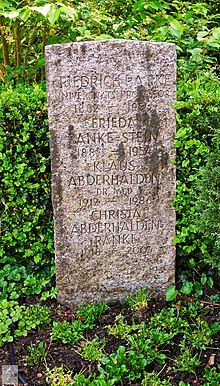Friedrich Ranke
Friedrich Ranke (born September 21, 1882 in Lübeck , † October 11, 1950 in Basel ) was a German Medieval Germanist and folklorist .
Career
Ranke was one of three sons of the Lübeck theologian Leopold Friedrich Ranke and his wife Julie, nee. von Bever (1850-1924). His brothers were the Egyptologist Hermann and the psychiatrist Otto .
After graduating from high school at the Katharineum in Lübeck at Easter 1901 (together with Joseph Carlebach ) Ranke studied German , English and Nordic philology between 1902 and 1907 at the universities of Göttingen (1902/03), Munich (1903/05) and Berlin (1905/07 ). In Munich he dealt for the first time with folklore research with Friedrich von der Leyen . In Berlin he did his doctorate with the thesis Language and Style in the Wälschen Gast des Thomasin von Circlaria . 1910/11 followed the habilitation at the University of Strasbourg with The Redeemer in the cradle . During his studies in Göttingen he became a member of the Black Castle Bund - connection Burschenschaft Germania .
From 1912 Ranke was a private lecturer in Göttingen. During the First World War , the Senate of the Hanseatic City of Lübeck awarded the Lübeck Hanseatic Cross to those fighting in the 2nd Kurhessian Infantry Regiment No. 82 . In 1917 he became professor for Germanic philology in Göttingen and in 1921 professor for German philology at the University of Königsberg . In 1930 he filled the chair of the same name at the University of Wroclaw , where he had to retire temporarily in 1937 due to a defamation suit brought by his colleague Walther Steller "because of non-Aryan infiltration". He was married to Frieda, geb. Stein, the sister of Marie Stein-Ranke , both of whom were considered “half-Jewish” according to the Nuremberg Laws .
In 1938 he therefore succeeded Eduard Hoffmann-Krayer as professor of German philology at the University of Basel .
His grave is in the Hörnli cemetery in Riehen BS.
Publications (selection)
- Language and style in the Wälschen guest of Thomassin von Circlaria. Diss. Berlin 1908 online - Internet Archive .
- The German folk tales. Munich 1910 (Deutsches Sagenbuch; 4).
- The Savior in the Cradle. A contribution to German folk tale research. Munich 1911 online - Internet Archive .
- Tristan and Isold. Munich 1925 (Books of the Middle Ages; 3).
- The allegory of the Minnegrotto in Gottfried's Tristan. Berlin 1925 (Königsberg learned society / humanities class: writings of the Königsberg learned society, humanities class; 2.2).
- Songs of Oswald von Wolkenstein on the hike . In: Folklore gifts. John Meier offered on his seventieth birthday , Berlin: de Gruyter 1934, pp. 157–166.
- Folk tale research. Lectures and Essays. Breslau 1935 (German Studies / A; 4).
- Old Norse elementary book. Literature, language, texts with translation and dictionary. Berlin 1937 (Göschen Collection; 1115).
- God, the world and humanity in German poetry in the Middle Ages. Basel 1952.
- Smaller fonts. Bern, Munich 1971 (Bibliotheca Germanica; 12).
- The tradition of Gottfried's Tristan. Darmstadt 1974.
literature
- Hartmut Freytag: Ranke, Friedrich . In: Lübeck CVs , ed. von Alken Bruns, Neumünster: Karl Wachholtz Verlag 1993, ISBN 3-529-02729-4 , pp. 317-320.
- Hartmut Freytag: Ranke, Friedrich. In: Christoph König (Ed.), With the assistance of Birgit Wägenbaur u. a .: Internationales Germanistenlexikon 1800–1950 . Volume 3: R-Z. de Gruyter, Berlin / New York 2003, ISBN 3-11-015485-4 , pp. 1460-1462.
- Rolf-Wilhelm Brednich : Ranke, Friedrich. In: Encyclopedia of Fairy Tales Vol. 11 (2004), Col. 203-207.
Individual evidence
- ^ Hermann Genzken: The Abitur graduates of the Katharineum in Lübeck (grammar school and secondary school) from Easter 1807 to 1907. Borchers, Lübeck 1907. (Supplement to the school program 1907) Digitized version , no. 1132
- ^ Hermann Goebel (ed.): Directory of members of the Schwarzburgbund. 8th edition, Frankfurt am Main 1930, p. 118 No. 2446.
- ↑ Lübeck city archives in terms of Senate files: Directory of the owner of the Lübeckischen Hanseatic Cross. Signature 1093.
Web links
- Literature by and about Friedrich Ranke in the catalog of the German National Library
- Friedrich Ranke's estate in the Basel University Library
- Michael Stolz: Ranke, Friedrich. In: Historical Lexicon of Switzerland .
- Works by Friedrich Ranke in the Gutenberg-DE project
- Friedrich Ranke in the Internet Archive
| personal data | |
|---|---|
| SURNAME | Ranke, Friedrich |
| BRIEF DESCRIPTION | German medievalist and folklorist |
| DATE OF BIRTH | September 21, 1882 |
| PLACE OF BIRTH | Lübeck |
| DATE OF DEATH | October 11, 1950 |
| Place of death | Basel |
